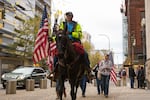As soon as the not guilty verdicts for Ammon Bundy and six people who led an armed occupation at the Malheur National Wildlife Refuge came down Thursday, questions of racial bias from the jurors and law enforcement began circulating on social media.
And legal experts say implicit bias likely did play a role in the acquittals.
“They went through the system and they were found not guilty. You have to respect that," said attorney and former South Carolina legislator Bakari Sellers.
"But you also have to understand and question what is the definition of justice in this country?”
Sellers, who also works as a CNN political commentator, said the federal government faltered in the case by not acting aggressively enough toward the all white defendants.
“I don’t think they would have been treated with such kid gloves, in fact, if they were African-American or Muslim or Native American," Sellers said. "To be honest with you, they would have all probably been dead."
Many people on social media noted the disparity in approach the federal government took in responding to the Malheur refuge takeover compared to Native American protesters standing against a controversial oil pipeline in the Dakotas.
In Malheur, the federal government spent 41 days negotiating for a peaceful surrender from the armed occupiers led by Bundy. In North Dakota on Thursday, the same day the Malheur verdict was delivered, law enforcement arrested more than 100 unarmed protesters using pepper spray, bean bags and military-style vehicles.
Armed White men in #OregonStandOff found not guilty But young protestors from #StandingRock forcibly removed and shot with rubber bullets.
— Areva Martin, Esq. (@ArevaMartin) October 28, 2016
So, ok to occupy a wildlife refuge, but protect ancestral grave sites and you get National Guarded. America 2016 #nodapl
— Bill McKibben (@billmckibben) October 27, 2016
Reaction to the verdict was seen locally as members of Don't Shoot Portland, a group advocating for police reform, held a rally Friday at Portland State University.
"We have witnessed this disparity via the Bundy trial in comparison to the treatment of peaceful protestors at the North Dakota Access Pipeline. What if we would have staged an armed occupation of City Hall?" Don't Shoot organizer Greg McKelvey said in a statement.
"[Bundy and the other Malheur defendants] are white, educated, religious and could speak to those jurors," said T. Greg Doucette, a defense attorney based in North Carolina. "Yeah, I think they had a tremendous advantage" going into the trial.
Doucette is a white, Republican lawyer who graduated from North Carolina Central University School of Law, one of only a handful of historically black law schools in the United States.
Related: 'This Land Is Our Land' Ep. 11: Verdict
Doucette said race wasn't the only factor in the acquittal. Part of the issue, he said, is that the government tried to bring more serious charges rather than simply trespassing against the occupiers.
"The firearms charge is kind of the most obvious example," Doucetee said. "It is a federal crime to bring a firearm into a federal facility unless you're law enforcement."
Under the firearm charge against Ammon Bundy and others in the case — 18 U.S. Code 930 — the government could have pursued a "liability-oriented" charge that would have only required proving the occupiers brought firearms to the refuge, but only carried a one-year maximum sentence.
Instead, prosecutors pursued a more complicated charge that required them to prove the defendants brought the firearms to impede federal officers from doing their jobs.
"I think what happened was you had a situation where the U.S. Attorney's Office wanted to send a message," Doucette said. "Knowing what we know now, I think they over-indicted."

A supporter displays a "NOT GUILTY!" button following the not guilty verdict delivered in the trial of seven occupiers of the Malheur National Wildlife Refuge.
Bradley W. Parks / OPB
Still, racial bias was undoubtedly a factor in the acquittals, according to Doucette, and the first step to addressing it in the justice system is acknowledging it exists.
"You've got a lot of folks who don't think it's a thing," he said. "And they're not willing to examine their own assumptions they make about people."
Sellers agrees.
"[Fixing implicit bias] has to begin with a conversation," he said. "We have to begin to talk to each other and respect each other in the dialogue of race relations in this country.
"This isn’t a new phenomenon," Sellers said. "And if we keep ignoring it, nothing will ever change."














